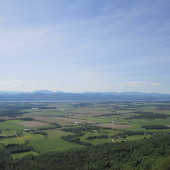
This case study describes the experiences developing and teaching a course entitled “Understanding Place” at the Middlebury School of the Environment 2015 summer session. The course sought to include multi-disciplinary approaches to place while simultaneously engaging students and faculty in hands-on projects across the Champlain Valley in Vermont. Rather than engaging in depth with specifics of environmental history in the Champlain Valley, however, students were asked to apply the multiple perspectives encountered in the course to develop elements of a “toolbox” related to understanding the significance of place in a world increasingly characterized by globalization and mobility. In other words, rather than learning complex details and history of a singular place, students developed perspectives for understanding, valuing, and protecting the many places where they may live throughout their lives. At the conclusion of the course students were asked to teach other members of the Middlebury community about their findings. This collaborative effort over six intensive weeks between students and faculty resulted in a creative pedagogical tool—an “understanding place cookbook”—that was shared with all School of the Environment participants, faculty, and staff. While this case study is grounded in the specific context of the Middlebury School of the Environment, it points to tools and experiences that could be useful for developing globally aware place-based education at any institution, bringing an appreciation of global stratification and inequality into localized efforts toward community sustainability and resilience.
Continue Reading